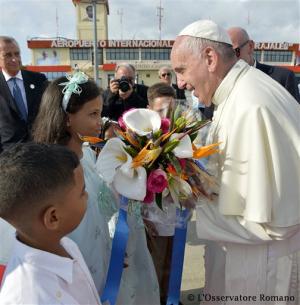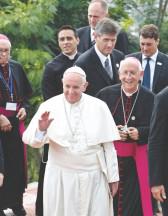|
Pope's historic visit has many optimistic about Church's future
By Todd Feathers
Lowell Sun
September 22, 2015
http://www.lowellsun.com/todaysheadlines/ci_28856735/popes-historic-visit-has-many-optimistic-about-churchs
 |
| In this photo taken on Monday, Sept. 21, 2015, children greet Pope Francis with flowers upon his arrival at Santiago de Cuba's airport, Cuba. Pope Francis began a 10-day trip to Cuba and the United States on Saturday, embarking on his first trip to the onetime Cold War foes after helping to nudge forward their historic rapprochement. |
 |
| Pope Francis visits the pilgrimage site Hill of the Cross in Holguin, Cuba, Monday. Today he begins his six-day visit to the United States where he will address Congress, among other groups. |
Over the past three decades, papal visits to the United States have been colored by shrinking participation in the Roman Catholic Church, the priest sexual-abuse scandal, and social issues that have at times illuminated fault lines between many American Catholics and the Vatican.
As Pope Francis begins his first visit to the country in Washington, D.C., today, few of those divides have been definitively resolved. But theologians and local Catholics said a change in the atmosphere is palpable as they prepare for a visit that could be equal parts shocking, refreshing and reaffirming to the American Catholic system.
"We might be surprised by how pointed he is when he speaks to the joint session of Congress and the U.N.," said Daniel J. Daly, chair of the Saint Anselm College Theology Department. "People will be uncomfortable but it won't be because he'll be talking about abortion and physician-assisted suicide, but because he'll be talking about suffering and mercy."
In terms of his position on issues such as gay marriage, abortion, and contraception, Pope Francis shares the doctrinal views of his predecessors, Daly added. But in his teachings, the Argentinean has chosen to emphasize economic inequality, environmentalism, and other themes of shared humanity.
Those issues draw on both core Catholic morals and populist ideals, and have so far helped the pope cultivate a fresh image for a faith that is losing members in the United States at a faster rate than any other denomination.
"It's not an easy road to be a faithful Catholic today," said Mary Ann Harold, general manager of WQPH Eternal Life Radio in northern Worcester County. "Personally, I'm looking to be reaffirmed as a practicing Catholic."
Francis' messages have particularly resonated with populations, such as Hispanic immigrants and millennials, that are vital to a resurgence of Catholicism in America. As the first Latin American pope, and the first pope to Tweet, he is well-positioned to communicate with them.
"I'm hoping that he's going to say something about immigration. This is a community that is really suffering because of immigration policies," said Rev. Paul Ouellette, who leads outreach to the Hispanic community for St. Patrick's Parish in Lowell. "I hope he doesn't get into sexual issues, the priest problem or same-sex marriage. Those are important issues but I hope he focuses on immigration."
While he will almost certainly address the refugee crisis in Europe and the Middle East when he speaks to the United Nations and a joint session of Congress, it would be surprising if Francis took a direct position on U.S. immigration laws or other specific domestic policies, said Tiziana Dearing, a professor at Boston College's School of Social Work.
"This is a time when neither party and neither end of the ideological spectrum can claim the pope to be theirs," she said. "Thematically, he has set himself up to speak on a broad, broad range of issues."
Given that enviable position, it is unlikely that Francis will use his trip to announce a surprise reform to church policy, Dearing added.
And while some aspects of Francis' leadership, such as comments on climate change and capitalism, have angered conservative politicians and dominated the media coverage leading up to his arrival, it is not the pope's style to force himself into politics, Ouellette said.
"When (Pope John Paul II) came, I don't think people knew what to expect," he said. "His visits were more political, they were heavy meetings. Pope Francis is more pastoral, he's speaking to the daily life of the people."
Contact: tfeathers@lowellsun.com
|

